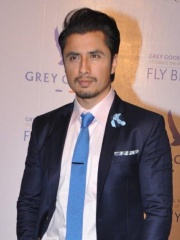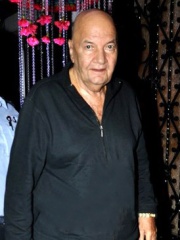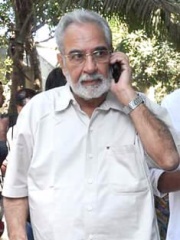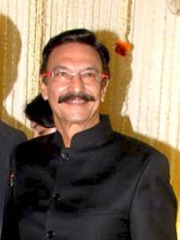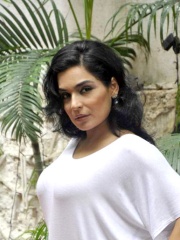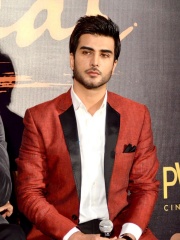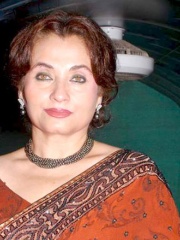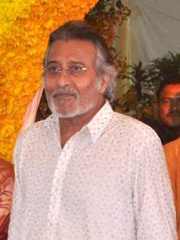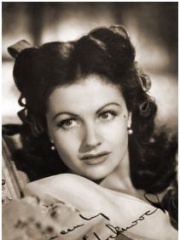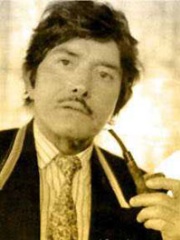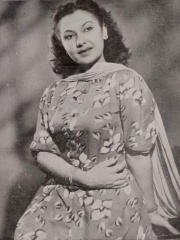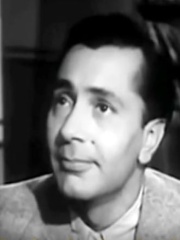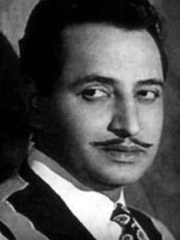
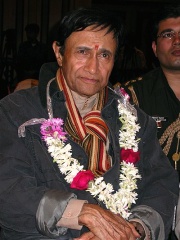

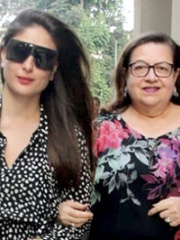
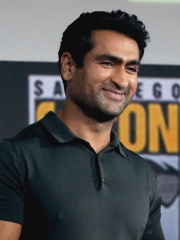
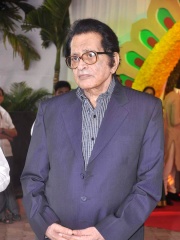
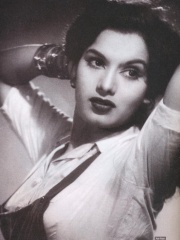
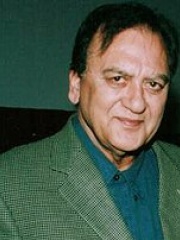
The Most Famous
ACTORS from Pakistan
Top 10
The following people are considered by Pantheon to be the top 10 most legendary Pakistani Actors of all time. This list of famous Pakistani Actors is sorted by HPI (Historical Popularity Index), a metric that aggregates information on a biography's online popularity. Visit the rankings page to view the entire list of Pakistani Actors.

1. Pran (1920 - 2013)
With an HPI of 75.64, Pran is the most famous Pakistani Actor. His biography has been translated into 88 different languages on wikipedia.
Pran Krishan Sikand (pronounced [pra:n]; 12 February 1920 – 12 July 2013), better known mononymously as Pran, was an Indian actor who worked in Hindi cinema. He was one of the most successful and respected actors in the history of Indian cinema; in a career spanning over six decades he was also one of the highest-paid actors of his time. Pran was in/famous for his villain roles, and a highly regarded character actor in Bollywood from the 1940s to the 1990s. He played heroes from 1940 to 1947, negative roles from 1942 to 1991, and supporting and character roles from 1967 to 2007. From the late 1940s through the 70s was the peak of Pran's career as a villain, especially in the 1950s and 60s: his interpretations were the first true personification of "evil" on the Indian screen, and the intensity of his portrayals of negative/villainous characters was such that the given name "Pran" fell into disuse. In a long and prolific career, Pran appeared in over 362 films. He played the leading man in Khandaan (1942), Pilpili Saheb (1954) and Halaku (1956), and was known for his roles in Madhumati (1958), Jis Desh Mein Ganga Behti Hai (1960), Shaheed (1965), Upkar (1967), Ram Aur Shyam (1967), Aansoo Ban Gaye Phool (1969), Purab Aur Paschim (1970), Johny Mera Naam (1970), Victoria No. 203 (1972), Be-Imaan (1972), Zanjeer (1973), Majboor (1974), Amar Akbar Anthony (1977), Don (1978), Sharaabi (1984) and Duniya (1984). Pran received many #Awards and honours in his career, including the Filmfare Award for Best Supporting Actor in 1967, 1969 and 1972, and was awarded the Filmfare Special Award in 1997. He was named "Villain of the Millennium" by Stardust Awards in 2000. The Government of India honoured him with the Padma Bhushan Award in 2001 for his contributions to the arts. He was honoured in 2013 with the Dadasaheb Phalke Award, the highest national award for cinema artists, by the Government of India. In 2010, he was named on the list of CNN's Top 25 Asian actors of all time. Pran died on 12 July 2013 at the age of 93 at Mumbai's Lilavati Hospital and Research Centre after suffering a prolonged illness.

2. Dev Anand (1923 - 2011)
With an HPI of 68.94, Dev Anand is the 2nd most famous Pakistani Actor. His biography has been translated into 41 different languages.
Dev Anand (Hindi pronunciation: [de:u ǝna:nd] ; born Dharamdev Pishorimal Anand; 26 September 1923 – 3 December 2011) was an Indian actor, writer, director and producer known for his work in Hindi cinema. He is considered as one of the greatest and most successful actors in the history of Indian cinema. Through a career that spanned over six decades, he worked in more than 100 films. Anand is a recipient of four Filmfare Awards, including two for Best Actor. The Government of India honoured him with Padma Bhushan, Indian third highest civilian honour in 2001 and with Dadasaheb Phalke Award in 2002. In 1946, Anand debuted with a lead role in Prabhat Films's Hum Ek Hain, a film about Hindu-Muslim unity. He had his first commercial success in Ziddi (1948) and gained widespread recognition with the crime thriller Baazi (1951), which is regarded as the forerunner of the spate of "Bombay Noir" films that followed in Hindi cinema in the 1950s. He consistently starred in top–grossing Indian films from the early-1950s to the 1970s, such as Jaal, Taxi Driver, Insaniyat, C.I.D., Paying Guest, Kala Pani, Kala Bazar, Jab Pyar Kisi Se Hota Hai, Hum Dono, Asli-Naqli, Tere Ghar Ke Samne, Guide, Jewel Thief, Johny Mera Naam and Haré Rama Haré Krishna. Despite the arrival of new crop of stars in the latter-half of the 1970s and 1980s, Anand continued to star in highly successful films, such as Amir Garib, Warrant, Jaaneman, Des Pardes and Lashkar. Some of his most acclaimed performances, include Munimji, Funtoosh, Baarish, Nau Do Gyarah, Solva Saal, Manzil, Jaali Note, Baat Ek Raat Ki, Sharabi, Teen Devian, Duniya, Prem Pujari, Tere Mere Sapne, Heera Panna and Lootmaar. The 2011 film Chargesheet, which Anand also directed was his final film.

3. Kabir Bedi (b. 1946)
With an HPI of 67.25, Kabir Bedi is the 3rd most famous Pakistani Actor. His biography has been translated into 41 different languages.
Kabir Bedi (born 16 January 1946) is an Indian actor. His career has spanned three continents covering India, the United States and especially Italy among other Western countries in three media: film, television and theatre. He is noted for his role as Emperor Shah Jahan in Taj Mahal: An Eternal Love Story and the villainous Sanjay Verma in the 1980s blockbuster Khoon Bhari Maang. He is best known in Italy and Europe for playing the pirate Sandokan in the popular Italian TV miniseries and for his role as the villainous Gobinda in the 1983 James Bond film Octopussy. Bedi is based in India and lives in Mumbai.

4. Babita (b. 1947)
With an HPI of 63.68, Babita is the 4th most famous Pakistani Actor. Her biography has been translated into 26 different languages.
Babita Shivdasani Kapoor (née Babita Hari Shivdasani; born 20 April 1947), also known mononymously as Babita, is an Indian retired actress who appeared in Hindi-language films. The daughter of character actor Hari Shivdasani and the cousin of actress and her contemporary Sadhana Shivdasani, Babita's debut film was the successful drama Dus Lakh (1966), but it was the romantic thriller Raaz (1967), opposite Rajesh Khanna, that gained her recognition. From 1966 to 1973, she starred in nineteen films as the lead heroine, including the box office successes Farz (1967), Haseena Maan Jayegi, Kismat (both in 1968), Ek Shriman Ek Shrimati (1969), Doli (1969), Kab? Kyoon? Aur Kahan? (1970), Kal Aaj Aur Kal (1971) and Banphool (1971). Following her marriage to actor Randhir Kapoor in 1971, she acted in Jeet (1972) and Ek Hasina Do Diwane (1972). Her subsequent release in 1973 was an average success, after which she decided to leave her career and became a housewife.
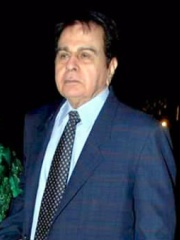
5. Dilip Kumar (1922 - 2021)
With an HPI of 61.05, Dilip Kumar is the 5th most famous Pakistani Actor. His biography has been translated into 52 different languages.
Muhammad Yusuf Khan (11 December 1922 – 7 July 2021), known professionally as Dilip Kumar, was an Indian actor, writer, ghost director and film producer best known for his work in Hindi cinema. Credited with pioneering method acting in cinema, he dominated Hindi cinema from the 1950s throughout the 1960s and is widely regarded as one of the greatest actors in the history of Indian Cinema. In a career spanning over five decades, Kumar worked in 57 films. He debuted as an actor in the film Jwar Bhata (1944), produced by Bombay Talkies. Following a series of unsuccessful ventures, he had his first box office hit in Jugnu (1947). He consistently starred in top–grossing Indian films from the late-1940s to the 1960s, such as Shaheed, Andaz, Babul, Deedar, Aan, Uran Khatola, Insaniyat, Azaad, Naya Daur, Madhumati, Paigham, Kohinoor, Mughal-E-Azam, Gunga Jumna and Ram Aur Shyam. Some of his most acclaimed performances, include Nadiya Ke Paar, Shabnam, Jogan, Tarana, Daag, Sangdil, Shikast, Footpath, Amar, Devdas, Musafir, Yahudi, Leader, Aadmi and Sunghursh. The 1970s saw Kumar's career take a downturn, with only one major success, Gopi (1970). In 1976, he went on a brief hiatus from film performances and returned with the revolutionary drama Kranti (1981), which was the highest-grossing Indian film of the year. He continued to play leading roles in films such as Vidhaata (1982), Karma (1986), and Saudagar (1991). His last on-screen appearance was in the commercially unsuccessful Qila (1998), which saw him in a dual role. Kumar later served as a member of the Rajya Sabha, the upper house of India's parliament, from 2000 to 2006. Kumar's personal life was the subject of much media attention, however, he himself had largely avoided media limelight and endorsements. He was in a long-term relationship with actress and frequent co-star Madhubala that ended after the Naya Daur court case in 1957. He married actress Saira Banu in 1966 and resided in Bandra, a suburb of Mumbai, until his death in 2021. For his contributions to film, the Government of India awarded him with the Padma Bhushan in 1991 and the Padma Vibhushan in 2015, the country's third and second-highest civilian awards respectively. He was also awarded India's highest accolade in the field of cinema, the Dadasaheb Phalke Award in 1994. In 1998, the Government of Pakistan conferred Kumar with Nishan-e-Imtiaz, their highest civilian decoration, making him the only Indian to have received the honour. The house that Kumar grew up in, located in Peshawar, was declared a national heritage monument in 2014 by the Pakistani government.

6. Kumail Nanjiani (b. 1978)
With an HPI of 59.80, Kumail Nanjiani is the 6th most famous Pakistani Actor. His biography has been translated into 33 different languages.
Kumail Ali Nanjiani (born May 2, 1978) is a Pakistani-American stand-up comedian, actor, and screenwriter. His accolades include a Screen Actors Guild Award, in addition to nominations for an Academy Award, Golden Globe Award, and two Emmy Awards. In 2018, Time magazine named him one of the 100 most influential people in the world. Nanjiani's breakthrough role came with his role as Dinesh in the HBO comedy series Silicon Valley (2014–2019). He is also known for his performances in the TNT series Franklin & Bash, the Adult Swim series Newsreaders, the comedy series Portlandia, the Disney+ miniseries Obi-Wan Kenobi, the series The Boys, and the Peacock series Poker Face. His voice acting roles include Prismo on the animated series Adventure Time and Kingo in the animated anthology series What If...?. He also co-hosted the Comedy Central show The Meltdown with Jonah and Kumail. In 2019, he was nominated for the Primetime Emmy Award for Outstanding Guest Actor in a Drama Series for his performance in The Twilight Zone. In 2023, he was nominated for the Primetime Emmy Award for Outstanding Lead Actor in a Limited or Anthology Series or Movie for his work in the miniseries Welcome to Chippendales. Nanjiani achieved wider recognition for co-writing and starring in the romantic comedy film The Big Sick (2017), which earned him and his wife Emily V. Gordon a nomination for the Academy Award for Best Original Screenplay. He also starred as Kingo in the Marvel Cinematic Universe (MCU) superhero film Eternals.

7. Manoj Kumar (1937 - 2025)
With an HPI of 58.80, Manoj Kumar is the 7th most famous Pakistani Actor. His biography has been translated into 30 different languages.
Harikrishan Giri Goswami, professionally known as Manoj Kumar (24 July 1937 – 4 April 2025), was an Indian actor, director, screenwriter, lyricist and editor who worked in Hindi cinema. He is regarded as one of the greatest and most accomplished actors of Indian cinema. He is noted for his acting in patriotism-themed films. In a career spanning over four decades, he worked in 55 films. Kumar was honoured with the Padma Shri in 1992 and Dadasaheb Phalke Award in 2015 by the Government of India for his contribution to Indian cinema and arts. He was also the recipient of a National Film Award and seven Filmfare Awards.

8. Shyama (1935 - 2017)
With an HPI of 58.58, Shyama is the 8th most famous Pakistani Actor. Her biography has been translated into 20 different languages.
Shyama (born Khurshid Akhtar; 7 June 1935 – 14 November 2017) was an Indian actress who appeared in Hindi and Punjabi films. She first appeared as a child artist in the 1945 Hindi film Zeenat as Baby Khurshid. She later adopted the screen name Shyama, given to her by film director Vijay Bhatt. After years of playing small parts and side roles in films like Shabnam (1949) and Tarana (1951), her breakthrough in a starring adult role came with Aar Paar (1954). She also had some success in Punjabi films like Posti (1950) and Kaude Shah (1953). Known for her versatility in various genres, Shyama went on to become a recognized star in both Hindi and Punjabi cinema in the 1950s and early 1960s. Some of her best known roles were in Sharada (1957), Bhabhi (1957), Barsaat Ki Raat (1960) and Zabak (1961). She later transitioned to taking on character roles in films like Milan (1967), Sawan Bhadon (1970) and her last film Hathyar (1989), after which she retired from acting.

9. Sunil Dutt (1929 - 2005)
With an HPI of 57.28, Sunil Dutt is the 9th most famous Pakistani Actor. His biography has been translated into 39 different languages.
Sunil Dutt (born Balraj Raghunath Dutt; 6 June 1929 – 25 May 2005) was an Indian actor, film producer, director, and politician known for his work in Hindi cinema. He acted in more than 80 films over a career spanning five decades and was the recipient of three Filmfare Awards, including two for Best Actor. Regarded as one of the most successful and finest actors in the history of Indian cinema, Dutt was known for his unique style and delivering impactful messages through his films. In 1968, the Government of India honoured him with the Padma Shri, India's fourth highest civilian award, for his contribution to Indian cinema. Dutt made his film debut in 1955 with the Hindi film Railway Platform. He rose to prominence with the highly successful films: Ek Hi Raasta (1956) and Mother India (1957), and consistently starred in several top–grossing Indian films from the late-1950s to the 1970s, such as Sadhna, Sujata, Gumrah, Waqt, Khandan, Mera Saaya, Hamraaz, Milan, Mehrban, Padosan, Heera, Zakhmee, Nagin, Daaku Aur Jawan and Jaani Dushman. Some of his acclaimed performances include Insān Jaag Utha, Chhaya, Mujhe Jeene Do, Nartaki, Yaadein, Gaban, Chirag, Darpan, Reshma Aur Shera, 36 Ghante, Muqabla and Dard Ka Rishta. Beginning in the early 1980s, Dutt featured in supporting roles in notable films such as Shaan, Badle Ki Aag, Kala Dhanda Goray Log, Watan Ke Rakhwale, Kurbaan and Munna Bhai M.B.B.S (his final film). In 1995, he was honoured with the Filmfare Lifetime Achievement Award for his five decades of contribution to the film industry. In 1958, Dutt married his Mother India co-star Nargis. Together, they had three children, including actor Sanjay Dutt. In 1984, he joined the Indian National Congress and was elected to Parliament of India for five terms, representing the constituency of Mumbai North West. Dutt served as the Minister for Youth Affairs and Sports in the Manmohan Singh government (2004–2005) and as Sheriff of Mumbai.
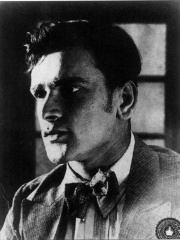
10. Prithviraj Kapoor (1906 - 1972)
With an HPI of 56.69, Prithviraj Kapoor is the 10th most famous Pakistani Actor. His biography has been translated into 33 different languages.
Prithviraj Kapoor (born Prithvinath Kapoor; 3 November 1906 – 29 May 1972) was an Indian actor who is also considered to be one of the founding figures of Hindi cinema. He was associated with IPTA as one of its founding members and established the Prithvi Theatres in 1944 as a travelling theatre company based in Mumbai. He was the patriarch of the Kapoor family of Hindi films, four generations of which, beginning with him, have played active roles in the Hindi film industry, with the youngest generation still active in Bollywood. His father, Basheshwarnath Kapoor, also played a short role in his movie Awara. The Government of India honoured him with the Padma Bhushan in 1969 and the Dadasaheb Phalke Award in 1971 for his contributions towards Indian cinema.
People
Pantheon has 54 people classified as Pakistani actors born between 1906 and 2002. Of these 54, 33 (61.11%) of them are still alive today. The most famous living Pakistani actors include Kabir Bedi, Babita, and Kumail Nanjiani. The most famous deceased Pakistani actors include Pran, Dev Anand, and Dilip Kumar. As of April 2024, 13 new Pakistani actors have been added to Pantheon including Zeba Bakhtiar, Priya Gill, and Danish Taimoor.
Living Pakistani Actors
Go to all RankingsKabir Bedi
1946 - Present
HPI: 67.25
Babita
1947 - Present
HPI: 63.68
Kumail Nanjiani
1978 - Present
HPI: 59.80
Art Malik
1952 - Present
HPI: 56.06
Ali Zafar
1980 - Present
HPI: 52.52
Prem Chopra
1935 - Present
HPI: 52.10
Fawad Khan
1981 - Present
HPI: 51.26
Kulbhushan Kharbanda
1944 - Present
HPI: 47.64
Suresh Oberoi
1946 - Present
HPI: 47.35
Meera
1977 - Present
HPI: 47.25
Imran Abbas
1977 - Present
HPI: 46.40
Salma Agha
1956 - Present
HPI: 45.69
Deceased Pakistani Actors
Go to all RankingsPran
1920 - 2013
HPI: 75.64
Dev Anand
1923 - 2011
HPI: 68.94
Dilip Kumar
1922 - 2021
HPI: 61.05
Manoj Kumar
1937 - 2025
HPI: 58.80
Shyama
1935 - 2017
HPI: 58.58
Sunil Dutt
1929 - 2005
HPI: 57.28
Prithviraj Kapoor
1906 - 1972
HPI: 56.69
Vinod Khanna
1946 - 2017
HPI: 54.82
Margaret Lockwood
1916 - 1990
HPI: 54.09
Raaj Kumar
1926 - 1996
HPI: 53.66
Manorama
1926 - 2008
HPI: 52.96
Balraj Sahni
1913 - 1973
HPI: 52.78
Newly Added Pakistani Actors (2025)
Go to all RankingsZeba Bakhtiar
1965 - Present
HPI: 37.96
Priya Gill
1977 - Present
HPI: 33.81
Danish Taimoor
1983 - Present
HPI: 31.78
Iman Ali
1980 - Present
HPI: 30.35
Hania Aamir
1997 - Present
HPI: 28.67
Sonya Jehan
1980 - Present
HPI: 27.49
Ayesha Omar
1981 - Present
HPI: 27.02
Yumna Zaidi
1989 - Present
HPI: 26.79
Meesha Shafi
1981 - Present
HPI: 26.17
Ayeza Khan
1991 - Present
HPI: 25.07
Maya Ali
1989 - Present
HPI: 25.00
Sanam Baloch
1986 - Present
HPI: 23.83
Overlapping Lives
Which Actors were alive at the same time? This visualization shows the lifespans of the 21 most globally memorable Actors since 1700.


